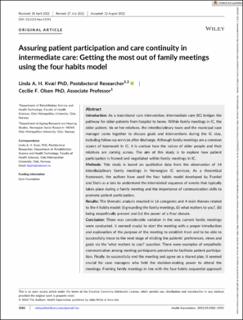Assuring patient participation and care continuity in intermediate care: Getting the most out of family meetings using the four habits model
Peer reviewed, Journal article
Published version
Permanent lenke
https://hdl.handle.net/11250/3054344Utgivelsesdato
2022Metadata
Vis full innførselSamlinger
Originalversjon
https://doi.org/10.1111/hex.13591Sammendrag
Introduction: As a transitional care intervention, intermediate care (IC) bridges the pathway for older patients from hospital to home. Within family meetings in IC, the older patient, his or her relatives, the interdisciplinary team and the municipal case manager come together to discuss goals and interventions during the IC stay, including follow-up services after discharge. Although family meetings are a common aspect of teamwork in IC, it is unclear how the voices of older people and their relatives are coming across. The aim of this study is to explore how patient participation is framed and negotiated within family meetings in IC. Methods: This study is based on qualitative data from the observation of 14 interdisciplinary family meetings in Norwegian IC services. As a theoretical framework, the authors have used the four habits model developed by Frankel and Stein as a lens to understand the interrelated sequence of events that typically takes place during a family meeting and the importance of communication skills to promote patient participation. Results: The thematic analysis resulted in 16 categories and 4 main themes related to the 4 habits model: (i) grounding the family meetings, (ii) what matters to you?, (iii) being empathically present and (iv) the power of a final closure. Conclusion: There was considerable variation in the way current family meetings were conducted. It seemed crucial to start the meeting with a proper introduction and explanation of the purpose of the meeting to establish trust and to be able to successfully move to the next stage of eliciting the patients' preferences, views and goals via the ‘what matters to you?’ question. There were examples of empathetic communication among meeting participants perceived to facilitate patient participation. Finally, to successfully end the meeting and agree on a shared plan, it seemed crucial for case managers who held the decision-making power to attend the meetings. Framing family meetings in line with the four habits sequential approach may have the potential to assure patient participation and care continuity in IC services.

